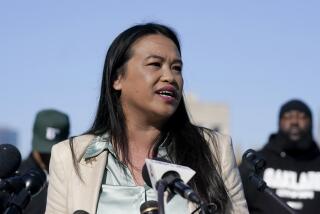2 Hong Kong Officials Step Down Amid Crisis
SHANGHAI — Two Hong Kong Cabinet members resigned Wednesday as fallout continued in the biggest political crisis to rock the Chinese territory since its 1997 hand-over from British rule.
The departure of Security Secretary Regina Ip and Financial Secretary Antony Leung comes after a series of protests by Hong Kong residents who say their Beijing-backed government is increasingly out of touch with its people. One rally drew an estimated half a million people.
Ip was the official responsible for pushing a widely unpopular anti-subversion bill known as Article 23. Opponents of the measure say that it would threaten the civil liberties, such as freedom of press and assembly, that set the region apart from its Communist motherland. The huge July 1 protest prompted the government to water down the bill; it was then tabled indefinitely after it lost critical legislative support.
In a statement released Wednesday, Ip defended her record, saying, “We have tried our best to strike a balance between protecting national security and safeguarding Hong Kong people’s rights and freedoms.”
Leung’s downfall sprang from his purchase of a Lexus shortly before he raised registration fees on luxury cars. He apologized and made a donation to charity, but that did little to improve his tarnished reputation.
“People have been saying that if he’s a politically sensitive gentleman, he should go, because he’s lost the trust of many Hong Kong citizens,” said X.L. Ding, a political scientist at the Hong Kong University of Science and Technology.
Both Ip and Leung had apparently offered to resign before but had been turned down by their boss, Chief Executive Tung Chee-hwa, until now, leading some analysts to believe that additional pressure came from Beijing.
China’s central government has become increasingly concerned over Hong Kong’s woes and has sent investigators in the aftermath of the Article 23 imbroglio to take the territory’s political temperature. And Tung is expected to fly to Beijing this weekend to brief officials there on recent developments.
“Beijing realizes some changes need to be made and unpopular ministers have to go,” said Anthony Cheung, a political scientist at the City University of Hong Kong.
Although happy to see Ip and Leung out of the picture, most people don’t believe that the two were the main problem; most of their resentment is directed at Tung. But Beijing is not prepared to oust him now, analysts say, for fear of sending the message that mass protests can bring political change.
Still, there are signs that Beijing’s patience might be running thin. Tung reorganized his government last year, and everything was supposed to work better. Instead, things got worse.
Although Tung’s administration has blamed Hong Kong’s limp economy for many of the territory’s problems, its poor handling of an outbreak of severe acute respiratory syndrome and the Article 23 backlash revealed deeper ills within the government’s structure and regarding its personnel choices.
Under the terms of its hand-over from Britain, Hong Kong became part of China yet kept considerable autonomy and political rights in accord with a formula known as “one country, two systems.” Although some analysts predicted that China would immediately try to exert strong control over the territory, Beijing has maintained a bit of distance and Hong Kong has drifted under rather weak leadership.
“The central government has one goal. They want Hong Kong not to be a problem,” said Michael DeGolyer, director of the Hong Kong Transition Project, a nonpartisan group of professors and other public policy experts. “Over the last six years, what has it turned into? They have mostly kept their hands off because they have more important things to take care of. Now it’s clear it can’t be left to itself.”
The departure of Ip and Leung may defuse tensions and get Hong Kong back on track. But analysts say Beijing must be careful to not appear to meddle too much in the affairs of the special administrative region.
Although Tung may survive in the short term, some speculate that he eventually will be forced out.
“This is a political move to gain time,” DeGolyer said. “They want to give him time to develop a health problem and move him aside.”
Tammy Wong in The Times’ Hong Kong Bureau contributed to this report.
More to Read
Sign up for Essential California
The most important California stories and recommendations in your inbox every morning.
You may occasionally receive promotional content from the Los Angeles Times.










